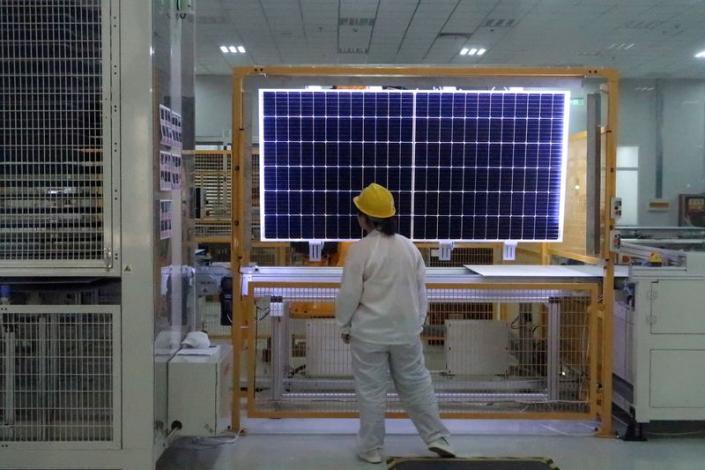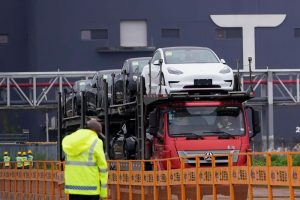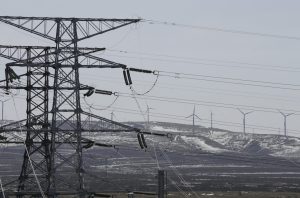Polysilicon producers in China are in talks on setting up a 50-billion-yuan fund ($7 billion) to buy and shut down a third of the country’s solar panel makers.
The firms want to restructure part of the loss-making sector by shutting at least 1 million metric tons of lower-quality capacity, GCL Technology Holdings, a top polysilicon producer, said.
“It is sort of like the OPEC of the polysilicon industry, wherein total supply for a specified timeframe has to be agreed by the central committee and production quotas to be allocated to producers,” GCL’s investor relations director Jun Zhu said.
ALSO SEE: Dozens of Countries Hit With Steep US Tariffs, But Some Feel Relief
The plan is one of the strongest signals yet that the heightened rhetoric against overcapacity rolled out by the Chinese government this month is translating into action. Chinese industries, from solar to electric vehicles, are grappling with massive overcapacity and vicious price wars that are wiping out profits.
Beijing restructured industries including polysilicon, steel and cement in previous waves of reforms more than a decade ago. However, this latest round is expected to be more difficult given many of the problem sectors are now filled with private firms and there are fewer growth sectors to pick up the slack.
The polysilicon acquisition vehicle would be launched late in the third quarter of this year and would start making purchases in the fourth quarter, both of excess capacity and of market inventories, Zhu said.
The proposed closures would leave approximately 2 million tons of capacity remaining in the market, he added. China’s production capacity was 3.25 million tons at the end of 2024, according to Bernreuter, an industry research group.
GCL chairman Zhu Gongshan said at an industry conference in June that major firms were working to restructure the industry, while local media Caixin reported producers were in talks to create an acquisition fund. Reuters is reporting the size, scope and timing of the plan for the first time.
China’s state planner, the National Development and Reform Commission, did not immediately respond to a request for comment.
China has a near-monopoly over solar-grade polysilicon, producing 95% of the world’s total in 2024, according to Bernreuter. China’s share of the rest of the solar supply chain, including cells, modules and wafers has also reached over 80% in recent years.
Polysilicon prices are up nearly 70% this month, alongside a range of other industrial commodities as Beijing’s rhetoric, plus smaller initiatives from various ministries and provincial governments led markets to bet supply-side reform was on the way.
Questions on funding
It is unclear where the money to finance the vehicle would come from, given major players GCL and Tongwei are losing money.
“No one knows how the capacity acquisition will be implemented, because there’s no past experience to refer to,” said UBS analyst Yishu Yan, adding that most of the companies in the sector are in debt.
Also unclear is how active a role the provincial and central governments will play in the vehicle and the factory closures it plans to make.
Jun Zhu said the vehicle’s central committee would be made up of producers, lenders and potentially regulators, without specifying who they would be.
Local governments are increasingly expected to fall in line with restructuring plans, given signals this week that the highest levels of China’s government are determined to combat price wars, Yan of UBS said on Friday, even though local officials might privately baulk at the employment and GDP impacts of plant closures.
Top Chinese leaders called again for disorderly competition among enterprises to be reined in, including tightening oversight of local governments’ investment promotion practices, at a meeting on Wednesday of the Politburo, a top decision-making body of the Communist Party whose July gathering typically sets the economic tone for the rest of the year.
Involution is a term widely used in China to describe a situation where intense competition leads to diminishing returns.
“My own feeling is that the anti-involution campaign has been escalated” after the Politburo meeting, Yan said. “It will be politically incorrect to still push back.”
Yan had previously said any plan to shut capacity may face opposition from local governments, where officials are scored on jobs and economic growth. Many of these governments also have stakes in local private solar firms.
“If the solar companies are facing bankruptcy or to be acquired, there could be some pushback by the local governments,” she said in an interview in mid-July.
Natixis economists, in a note on Friday on China’s anti-involution drive, cautioned that mergers and acquisitions alone may not shrink investment in renewables by enough to fix oversupply.
“All in all, it seems quite clear that the very large number of zombie renewable companies needs to shrink, possibly via defaults. If social stability is too important for such cleanup to happen, the mergers and acquisitions – the Chinese government seems to be willing to push – need to bring about a massive reduction in capacity for this sector to see the light at the end of the tunnel,” the economists wrote.
- Reuters with additional editing by Jim Pollard
ALSO SEE:
China’s Leaders Keen to End Vicious Price Wars, Curb Deflation
Is China Finally Set to Rein in its Huge Industrial Overcapacity?
China’s Xi Issues Rare Warning on Over-Investment in EVs, AI – FT
China Softens Tone on US Ties Amid Potential Thaw In Chip War
China’s Criticism of Price Wars Sheds Light on Xi’s ‘Waning’ Power
China’s Intense EV Price War Taking a Toll on Car Dealers
A Deflationary Spiral Looms Over China as Overcapacity Bites
Solar Overcapacity Kills Projects, Fuels Bankruptcies In China
Creative Ideas Needed to Stem China’s Overcapacity: US Official
Decline in China’s Solar Output Seen Due to Oversupply – PV Mag
























